Have you ever left your jerky in the dehydrator for too long, or just left it a bit too long without eating it? I think the only person who has ever NOT done this is my carnivorous husband!
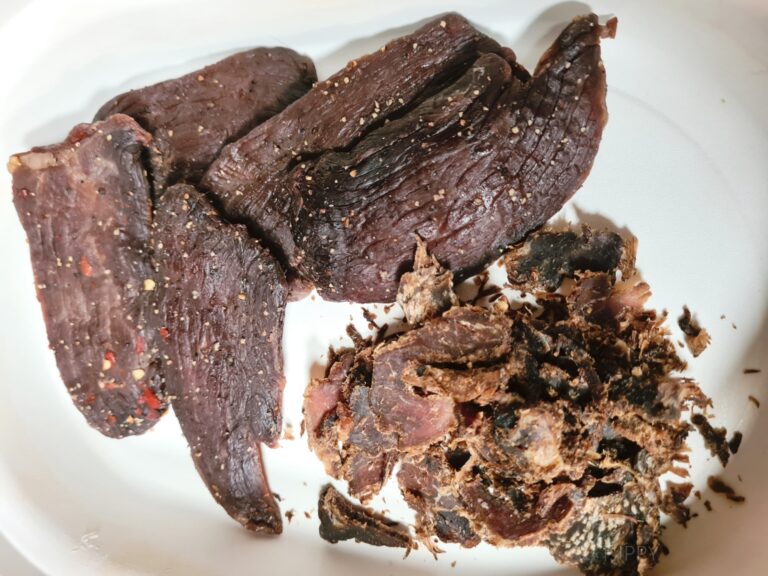
Jerky that has been neglected is not very palatable. The lack of moisture can make it taste powdery or bland.
What can you do? Feed it to a golden retriever or three? Not in my house!
There are a few ways you can make your beef jerky soft again to use in your recipes or eat as a quick snack – obviously, the easiest way to do this is to not let it get too hard in the first place. I’ll tell you all about how to do that in this post.
But if your jerky is already hard as a rock, don’t despair. I’ll also give you some tips on how to bring it back to life in this post!
The easiest way to make your beef jerky softer is to brush it with a liquid, and let it sit for a day. But there are several ways to do it, so I’ll get into the nitty gritty in what follows…
Table of Contents
Why is My Beef Jerky Hard?
Wondering why your beef jerky got too hard?
The answer has to do with the way that beef jerky is made. To make beef jerky, strips of meat are typically soaked in a solution of salt, water, and spices (usually things like black pepper, garlic powder, or onion powder).
This process helps to tenderize the meat and also prevents bacteria from growing.
After the meat has been soaked, it is then placed in a dehydrator, oven, or smoker on a baking sheet or on racks where the temperature is carefully controlled on the dehydrator trays.
The goal is to remove as much moisture from the cooked meat as possible while still keeping it edible for the dishes you want to use it in.
However, if the temperature gets too high or the meat isn’t dried properly, it can become hard and brittle. Additionally, if the meat wasn’t properly soaked in the brine solution, it can also become tough.
So, if you find yourself with a bag of hard beef jerky, your best bet is to just throw it away and start fresh with a new batch.
Can You Really Rehydrate Jerky? Is It Possible?
Yes, it’s possible to rehydrate jerky. You can microwave it, sauté it, or submerge it in water or even soup!
Depending on whether you just want your jerky to be a little moisture, or you want to soften it completely to cook it, there are several methods to bring back the succulent, meaty taste.
Method #1: The Microwave Method
Rehydrating jerky in the microwave is quick and easy to do without the wait. However, do not forget that you are busy rehydrating it and forgetting it in the microwave.
If you use the microwave to dehydrate it, you run the risk of burning it, and consequently being forced to donate it to a willing golden retriever or three.
Step 1: Place the dry jerky into a microwavable bowl with a small glass or bowl of water. Place the lid over the top without sealing it and microwave for one minute.
Step 2: Place a small bowl of water inside the container with the jerky.
You can also wet and then wring all the water out of a paper towel and set it in the container instead of or in addition to the bowl of water, or you can moisten a paper towel (make sure the whole towel is moist) and place it over the jerky:
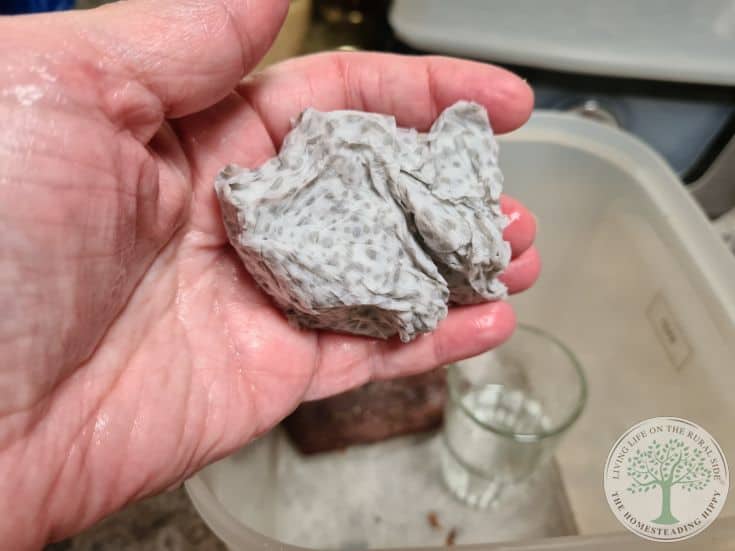
(Be very careful if you do it this way as the paper can become overheated, and burn.)
Wet a Paper Towel and Squeeze All the Water Out of It Before Placing It in the Microwavable Container with the Jerky
Step 3: Place the lid on the container without sealing it:
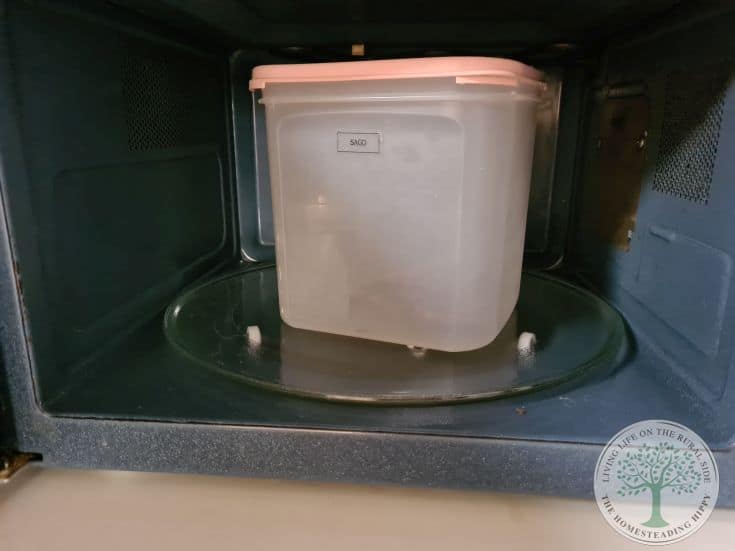
Step 4: Microwave at 1-minute intervals until moistened to taste (1 minute is usually enough for shaved, sliced, or sheets of jerky)
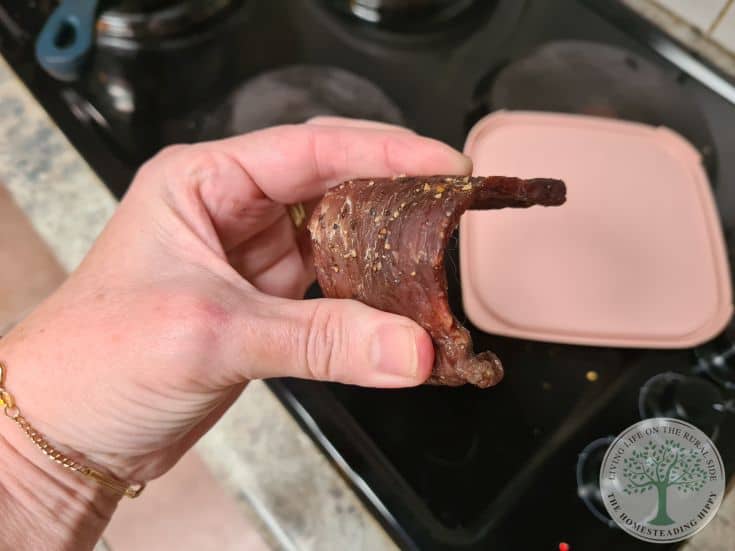
Do not wait too long before you eat the moistened jerky, if it is left it will dry out more than it did the first time very quickly.
Method #2: Sauté
Sautéing your jerky works really well to add moisture or to cook up for a meal.
Doing it is as easy as this:
Step 1: Slice onions and place them in a frying pan.
Step 2: Add your jerky.
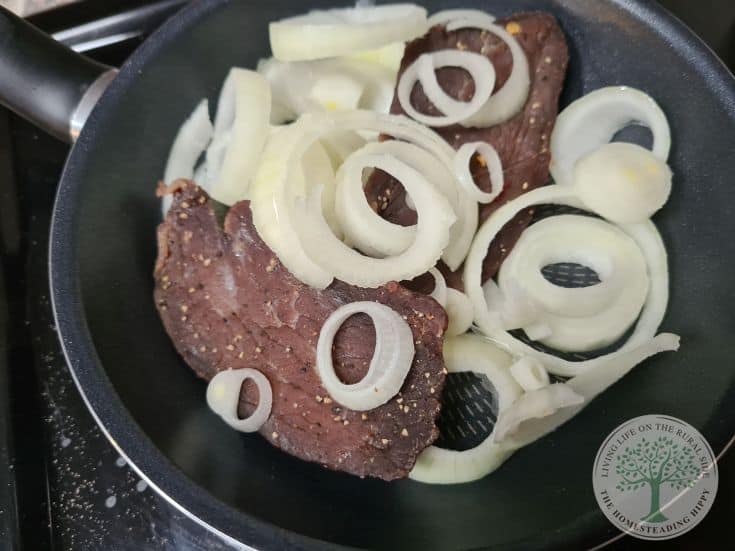
Step 3: Cover with a lid that doesn’t seal the pan.
Step 4: Wait half a minute and flip the dried meat, then give it another half a minute.
Step 5: When the meat is as soft as you want it, remove it from the heat.
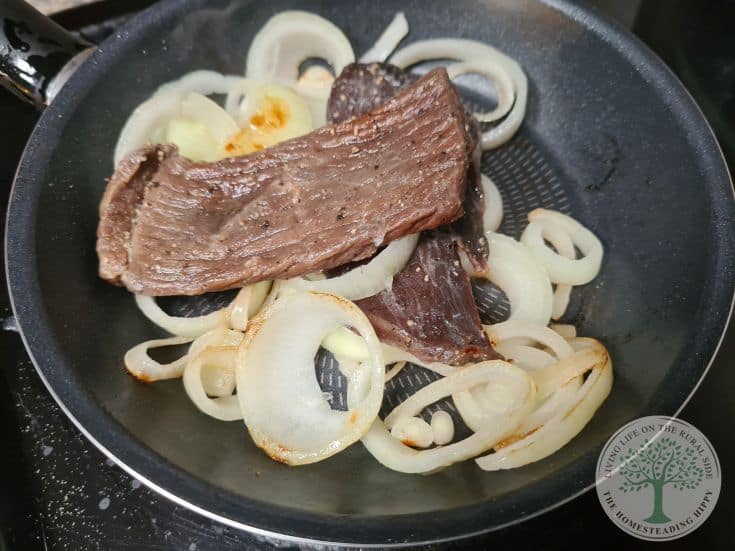
Step 6: Let it cool if you want jerky or serve it hot with your meal.
If you want to cook it as a normal steak, you can rehydrate it completely in water first, and then sauté or fry it.
Method #3: Using Liquids
You can rehydrate your jerky using water, soup, broth, or wine (you don’t need a lot, so do not worry, there will be plenty of wine left to consume).
The ratio of liquid to jerky should be 1:1. The jerky should be fully submerged in it.
It takes 10 – 30 minutes to rehydrate jerky depending on how thick the jerky is and how moist you want it.
If you use boiling water, soup, broth, or wine, it will take 10 – 15 minutes to soften the meat.
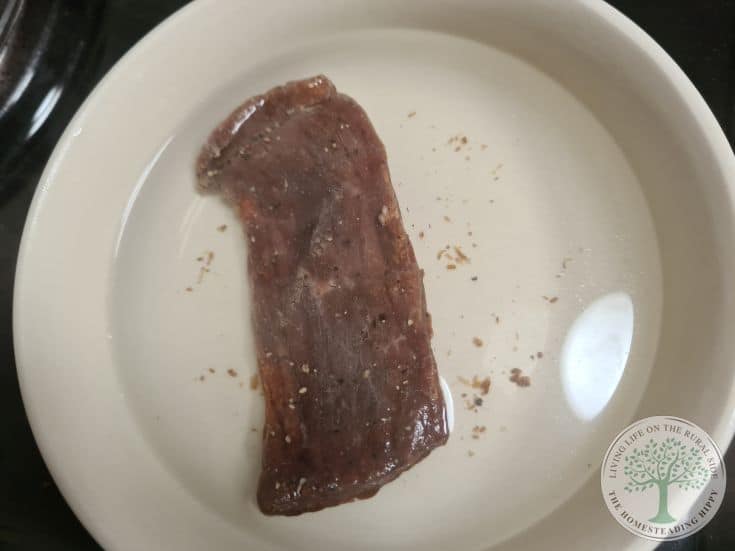
If you are using cold water, soup, broth, or wine, it will take 15 – 30 minutes to soften
When you remove your jerky from the wet liquid, place it on a dry paper towel and allow the moisture to evaporate from the surface of the meat.
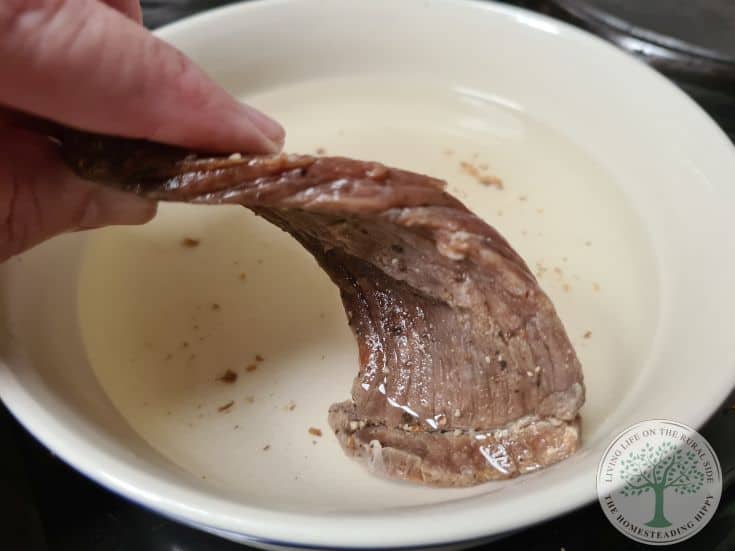
Method #4: In the Fridge
There are two ways to rehydrate jerky in the fridge.
The first way is by using a vegetable. Vegetables are a great source of moisture for rehydrating jerky (or any dehydrated meat). What’s more, little to no effort is needed.
Simply:
Step 1: Place the jerky in a zip lock bag or a sealable container.
Step 2: Add a vegetable (chopped or whole). I find that carrots, celery, or potatoes work best.
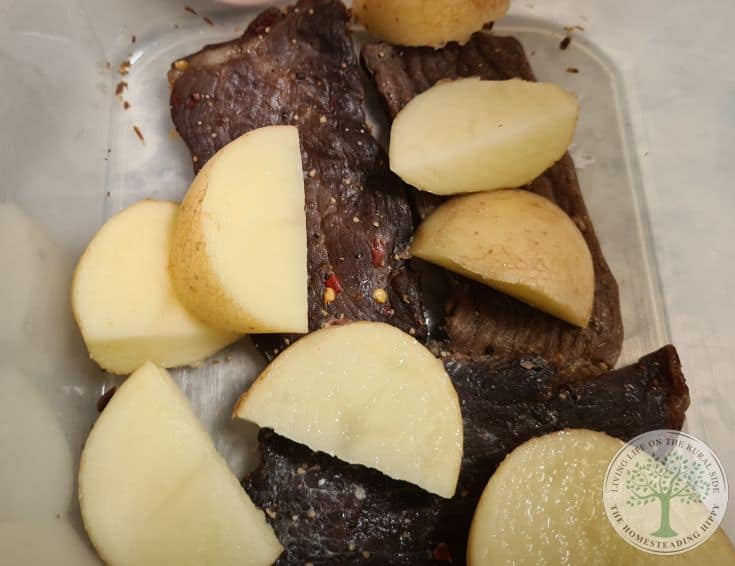
Step 3: Seal the bag or container.
Step 4: Place the bag or the container in the fridge overnight.
The second way is by using a damp paper towel.
Step 1: Place the jerky in a Ziploc bag or a sealable container
Step 2: Wet two pieces of paper towel and wring all the water out.
Step 3: Place the paper towel in the bag or container.
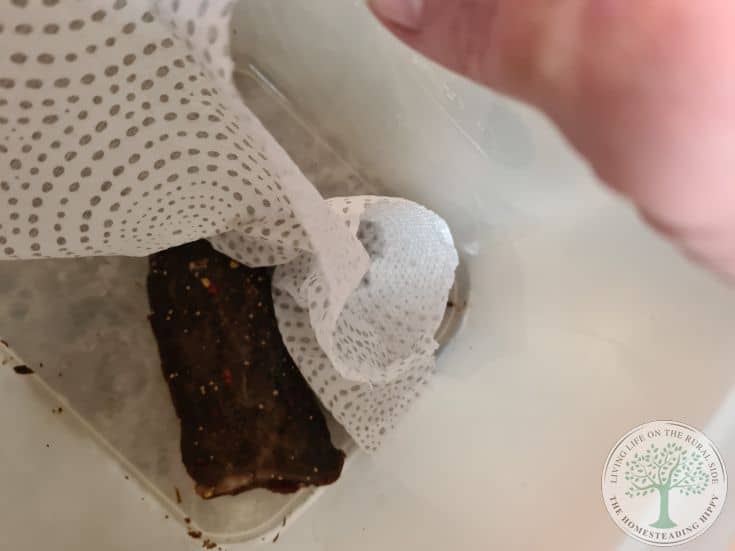
Step 4: Seal the bag or container.
Step 5: Place the bag or container in the fridge overnight.
This is a long time to live without your jerky, but if you are patient, the meat will taste great.
Method #5: With Sauce
Using some of the sauces you used in your marinade will help give your jerky that same bump of taste you had in mind when you dehydrated it.
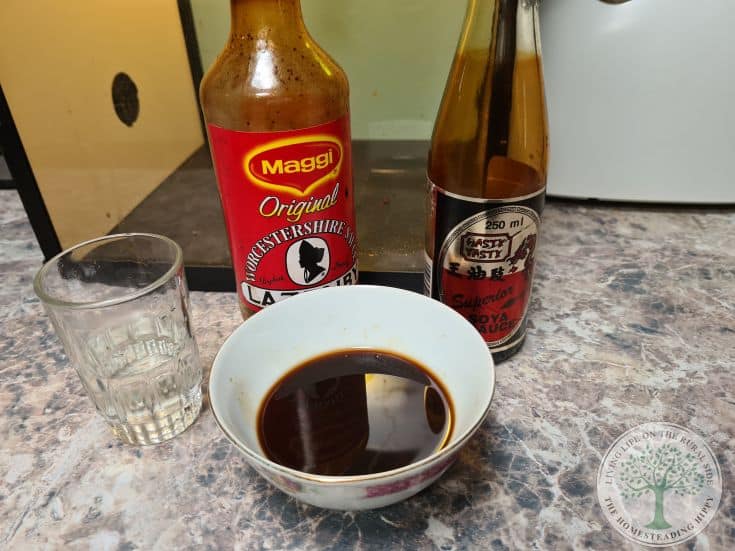
Step 1: Use soy sauce or Worcestershire sauce (you can add water to either of these if you want).
Using the sauce you marinated your jerky in will keep the original taste. You can add a little water to aid the rehydration without making the jerky too spicy.
Step 2: Brush the jerky with the sauce:
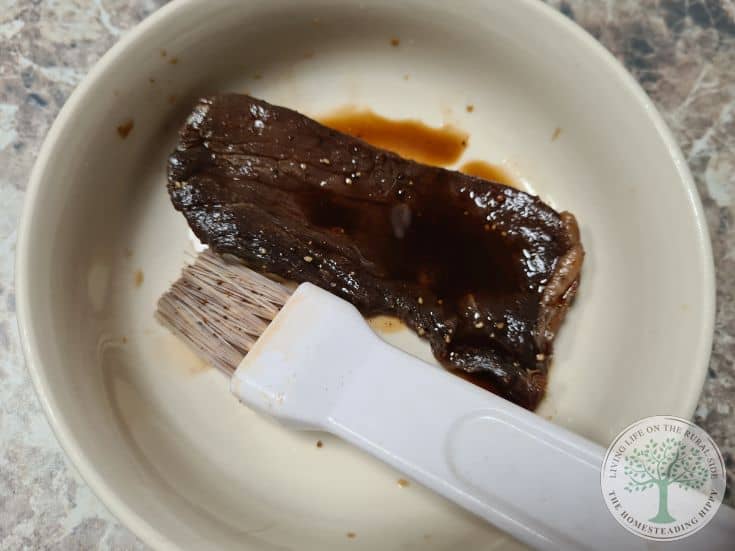
Step 3: Turn the meat over every twenty minutes brushing each side with the sauce.
Step 4: Depending on how soft or wet you want your jerky, this normally takes about an hour.
Method #6: Noodles
I have never gone hiking without jerky and noodles in my pack. They are lightweight, convenient, easy to prepare, and packed with energy.
Step 1: Make your noodles as you normally would with boiling water.
Step 2: Add your jerky right from the start so that it cooks with the noodles.
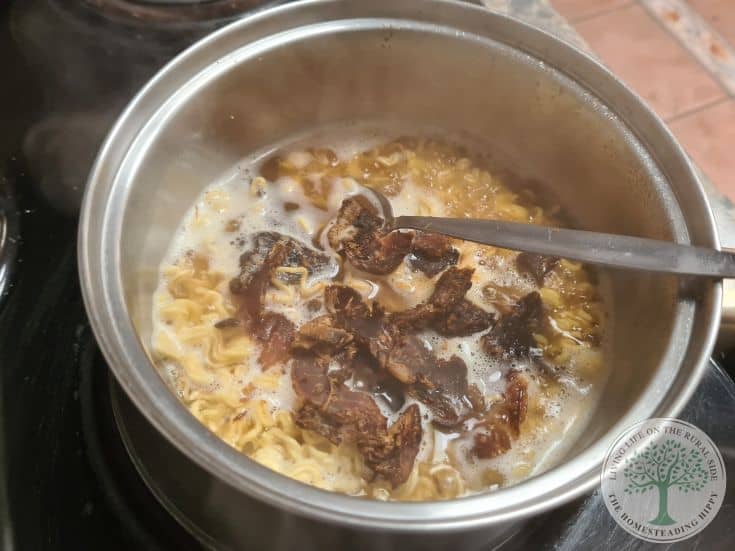
That is it! It takes two minutes to prepare and then you are on your way.
Whether You Are Looking for a Quick Bite to Eat or a Full Hiking Trail Meal, Noodles and Jerky Go Hand in Hand
Method #7: Stew
Jerky is the perfect meat source in a stew. Because stew normally takes a while to cook, the meat comes out juicy and soft, and it adds a fantastic taste to your stew.
Step 1: Chop up all the vegetables for your stew.
Step 2: Chop your jerky into smaller chunks.
Step 3: Place your vegetables and jerky in a pot or slow cooker.
Step 4: Add the gravy or stock of your choice.
Step 5: Let it cook.
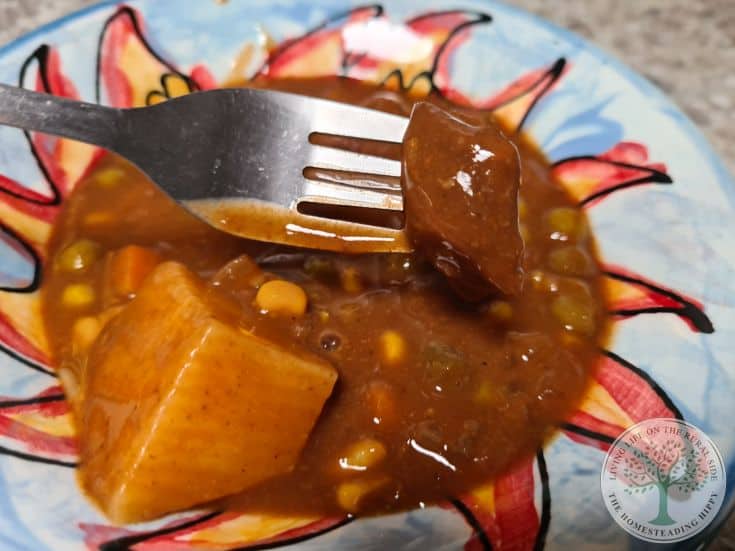
On the stove, this will take about an hour to cook (I always do it on medium heat). I prefer to do my stew in my slow cooker. When I get up in the morning, I prepare the stew and get it into the slow cooker; I set it on low. By suppertime, the stew is ready.
The taste is decadent!
FAQ
One option is to soak it in water or vinegar for 10-15 minutes before eating. This will help to rehydrate the meat and make it more pliable. Another option is to microwave the beef jerky for 30-60 seconds, which can also help to make it more tender. Finally, you can try marinating the beef jerky in a sauce or rub before cooking, which can help to add flavor and tenderness.
Surprisingly, jerky can actually rehydrate surprisingly well. While it may not taste as good as fresh meat, jerky that has been soaked in hot water will regain much of its original texture, consistency, and flavor.
While it may seem like jerky is practically indestructible, it is possible to overcook it. Jerky that has been overcooked will be dry and crumbly, and may even have a slightly burnt taste. In addition, overcooked jerky will be less flexible and more brittle, making it difficult to eat.


Di-Anne Devenish Seebregts was raised in an environment where daily life consisted of hiking, environmental conservation, growing fruit and vegetables, and raising poultry for meat and eggs.
She combined her passion for the writing word with her love of the pride that comes with not relying on others. She raised three children (who are now adults) to value the environment, and understand the value of being self-sufficient.
Find out more about Di-Anne on our About Us page.

Pemmican!
Great tips. We need more people with your beliefs, wisdom, & morals on this planet. It sure would be a better place to live if we did. Thank you